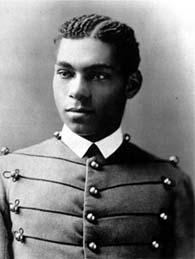
Henry Ossian Flipper was born
in Thomasville, Georgia, on March 21, 1856, into slavery and spent his formative years in Georgia. Following the Civil War, he
attended the American Missionary Association Schools in his home state. In 1873 Flipper was appointed to the U.S. Military Academy,
and in 1877 he became the first African-American to graduate from the institution. He was commissioned a second lieutenant and
assigned to the 10th Cavalry. From 1878 until 1880 Lieutenant Flipper served on frontier duty in various installations in the
southwest, including Fort Sill, Oklahoma. His duties included scouting, as well as serving as post engineer surveyor and
construction supervisor, post adjutant, acting assistant and post quartermaster, and commissary officer.
In 1881 Lieutenant Flipper's commanding officer accused him of "embezzling funds and of conduct unbecoming an officer and a
gentleman." As a result of these charges, he was court-martialed.

He was acquitted of the embezzlement charge but was found
guilty, by general court martial, of conduct unbecoming an officer. On June 30, 1882, he was dismissed from the Army as required by this conviction.
As a civilian, Henry Flipper went on to distinguish himself in a variety of governmental and private engineering positions. These included serving as surveyor, civil and military engineer, author, translator, special agent of the Justice Department, special assistant to the Secretary of the Interior with the Alaskan Engineering Commission, aide to the Senate Committee on Foreign Relations, as well as an authority on Mexican land and mining law.
He wrote and published several works. His first publication was an autobiography, The Colored Cadet at West Point ( New York: Lee, 1878; reprint, New York: Arno, 1898). His memoirs, Black Frontiersman: The Memoirs of Henry O. Flipper, first Black Graduate of West Point (Fort Worth, Texas: Texas Christian University Press, 1997) were compiled and edited with introduction and notes by Theodore D. Harris. His other works included Spanish and Mexican Land Laws: New Spain and Mexico for the Department of Justice in 1895.
Throughout the balance of his life, Henry Flipper maintained that he was innocent of the charges that resulted in his court-martial and dismissal from the Army and made numerous attempts to have his conviction reversed. He died in Georgia in 1940.
In 1976 descendants and supporters applied to the Army Board for the Correction of Military Records on behalf of Lieutenant Flipper. The Board, after stating that it did not have the authority to overturn his court-martial convictions, concluded the conviction and punishment were "unduly harsh and unjust" and recommended that Lieutenant Flipper's dismissal commuted to a good conduct discharge. The Assistant Secretary of the Army (Manpower and Reserve Affairs) and The Adjutant General approved the Board's findings, conclusions and recommendations and directed that the Department of the Army issue Lieutenant Flipper a Certificate of Honorable Discharge, dated 30 June 1882, in lieu of his dismissal on the same date.
On October 21, 1997, a private law firm filed an application of pardon with the Secretary of the Army on Lieutenant Flipper's behalf. Seven months later, the application was forwarded by the Acting Assistant Secretary of the Army (Manpower and Reserve Affairs) to the Office of the Pardon Attorney, Department of Justice, with a recommendation that the pardon be approved. President William Jefferson Clinton pardoned Lieutenant Henry O. Flipper on February 19, 1999. In pardoning this officer, the President recognized an error and acknowledged the lifetime accomplishments of this American soldier.
Remarks by President Clinton at the Ceremony Honoring LT Henry O. Flipper
